The Intel Broadwell Review Part 2: Overclocking, IPC and Generational Analysis
by Ian Cutress on August 3, 2015 8:00 AM ESTGenerational Tests: Office and Web Benchmarks
For this review, as mentioned on the front page, we retested some of the older CPUs under our new methodology. We did this testing at stock frequency as well as the IPC testing to see the ultimate real world result when you add in HyperThreading and frequency into the mix. If you recall back in our Devil’s Canyon i7-4790K review, the new high 4.4 GHz frequency of the i7-4790K was a tough one to beat for the newer architecture purely because any IPC gains are nullified by the older processor having a lot more frequency. With the Broadwell based i7-5775C being at 3.7 GHz and only 65W, this is a tough task. But what about if you are still running the Sandy Bridge based i7-2600K?
Some users will notice that in our benchmark database Bench, we keep data on the CPUs we’ve tested back over a decade and the benchmarks we were running back then. For a few of these benchmarks, such as Cinebench R10, we do actually run these on the new CPUs as well, although for the sake of brevity and relevance we tend not to put this data in the review. Well here are a few of those numbers too.
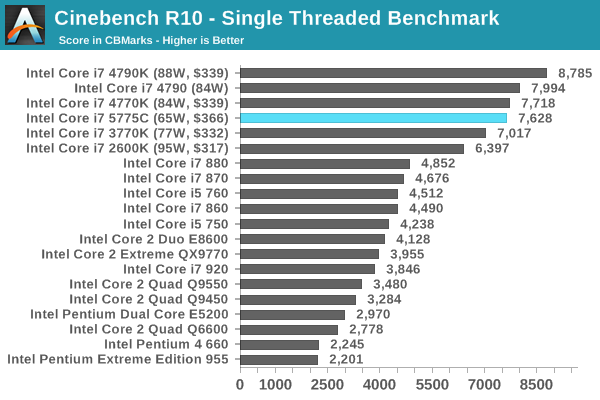
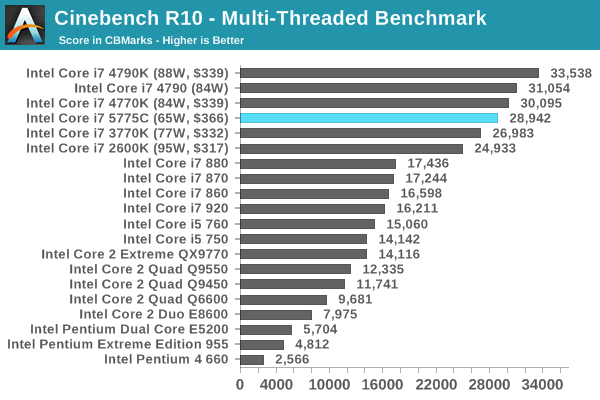
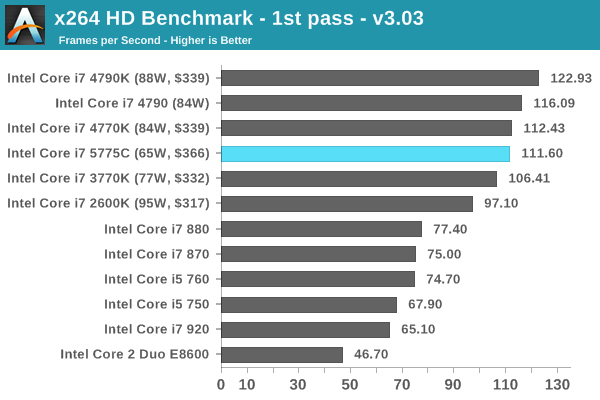
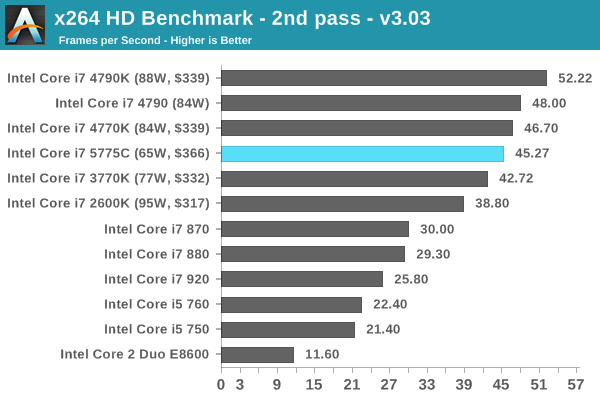
With some of these benchmarks, due to applications using new instruction sets, having the newer processors with the new instructions can make a lot of difference. Even in Cinebench R10, moving from the Core 2 Quad Q9550 to a Broadwell can get a 2.5x speed-up in this old software.
For the rest of our CPU benchmarks, here is what the landscape looks like with the most recent architectures. All of our benchmark results can also be found in our benchmark engine, Bench.
Office Performance
The dynamics of CPU Turbo modes, both Intel and AMD, can cause concern during environments with a variable threaded workload. There is also an added issue of the motherboard remaining consistent, depending on how the motherboard manufacturer wants to add in their own boosting technologies over the ones that Intel would prefer they used. In order to remain consistent, we implement an OS-level unique high performance mode on all the CPUs we test which should override any motherboard manufacturer performance mode.
Dolphin Benchmark: link
Many emulators are often bound by single thread CPU performance, and general reports tended to suggest that Haswell provided a significant boost to emulator performance. This benchmark runs a Wii program that raytraces a complex 3D scene inside the Dolphin Wii emulator. Performance on this benchmark is a good proxy of the speed of Dolphin CPU emulation, which is an intensive single core task using most aspects of a CPU. Results are given in minutes, where the Wii itself scores 17.53 minutes.
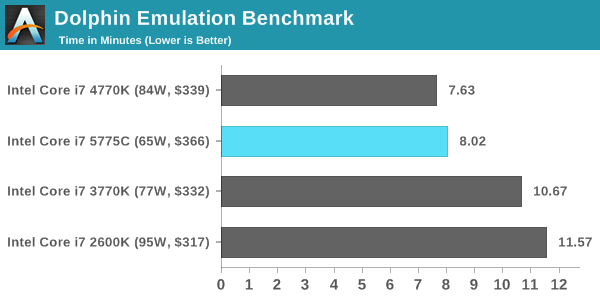
WinRAR 5.0.1: link
Our WinRAR test from 2013 is updated to the latest version of WinRAR at the start of 2014. We compress a set of 2867 files across 320 folders totaling 1.52 GB in size – 95% of these files are small typical website files, and the rest (90% of the size) are small 30 second 720p videos.
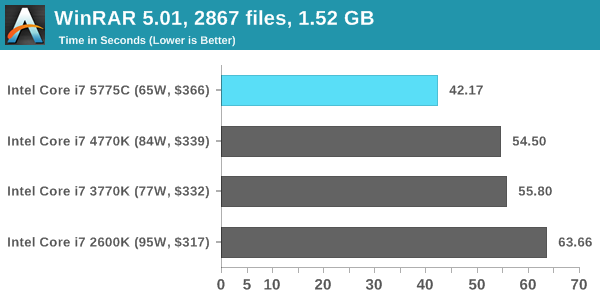
3D Particle Movement
3DPM is a self-penned benchmark, taking basic 3D movement algorithms used in Brownian Motion simulations and testing them for speed. High floating point performance, MHz and IPC wins in the single thread version, whereas the multithread version has to handle the threads and loves more cores.
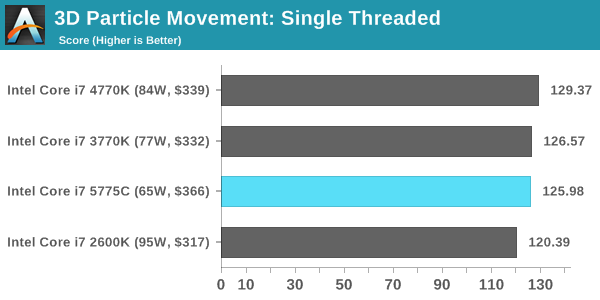
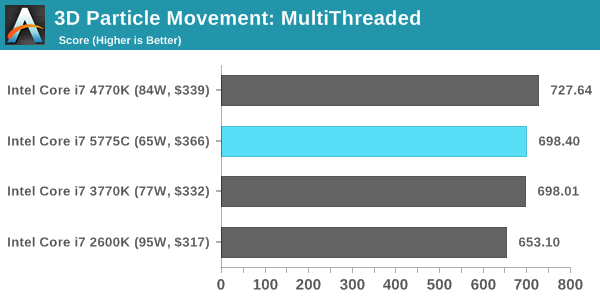
FastStone Image Viewer 4.9
FastStone is the program I use to perform quick or bulk actions on images, such as resizing, adjusting for color and cropping. In our test we take a series of 170 images in various sizes and formats and convert them all into 640x480 .gif files, maintaining the aspect ratio. FastStone does not use multithreading for this test, and results are given in seconds.
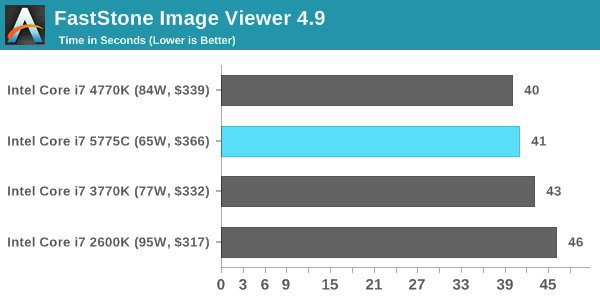
Web Benchmarks
On the lower end processors, general usability is a big factor of experience, especially as we move into the HTML5 era of web browsing. For our web benchmarks, we take four well known tests with Chrome 35 as a consistent browser.
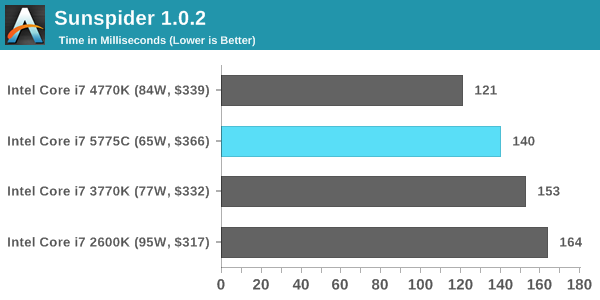
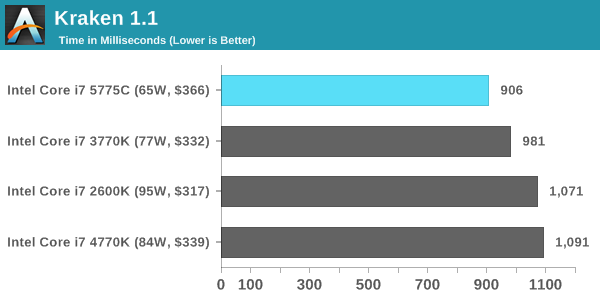
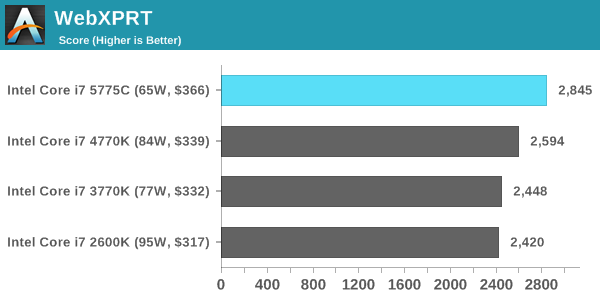
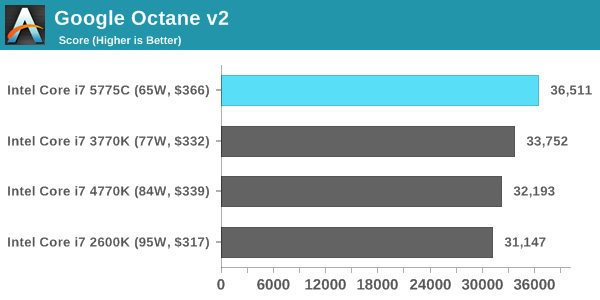










121 Comments
View All Comments
BMNify - Monday, August 3, 2015 - link
"there is plenty of talk surrounding the upcoming launch of Skylake, an architectural update to Intel’s processor line on 14nm. I can’t wait to see how that performs in relation to the four generations tested in this article."remember that the PR folks will be trying to compare the slower broadwell to the skylake and not the faster overall Haswell so these 4way/5way tests will be critical to your purchase choices. well done and lets hear about the missing/fused off! AVX updates inside the consumer skylake
Midwayman - Monday, August 3, 2015 - link
I keep hoping for a reason to upgrade my i7-2500k, but I'm just not seeing it here outside of maybe you do a lot of time critical work in the areas it has larger improvements. For gaming the differences seem really 'meh' Money better spent on keep up with GPUs. Everything else is 'fast enough'Impulses - Monday, August 3, 2015 - link
Think you mean i5 there, or 2600K... No such thing as an i7 2500K AFAIK. ;P There's some gaming scenarios where Sandy Bridge starts to lag behind, tho they're fringe cases, e.g. 4K/Eyefinity with CF/SLI and very recent games that are actually CPU bound a little in certain areas. There's also minimum fps vs average which is often overlooked. If I upgrade it'll be largely for the platform benefits (namely M.2 with enough lanes to use it), and I'm tempted by Haswell-E, we'll see...Achaios - Monday, August 3, 2015 - link
The "OC" page is not correct/misleading.a. A "Good" OC for the 2500k/2600k SB chips is 4.5 GHz. 4.7 GHz 24/7 is for the incredibly small minority that watercools with custom loops and 4.9 GHz is for the 5% or so of the guys who won the silicon lottery and custom watercool as well.
You can't believe how cheap most people are. Most people just rock the Cooler Master Hyper 212 Evo for $25. You can't do 4.7 GHz with a 212. Period.
-Haswell 1st gen: Avg OC 4.3 GHz, Good OC: 4.6 GHz
-Haswell 2nd Gen: Avg OC: 4.6 GHz, Good OC: 4.8 GHz - 4.9 GHz 24/7 is for the ppl who won the silicon lottery.
Oxford Guy - Monday, August 3, 2015 - link
Enthusiast websites do several things wrong, generally:1) open test beds with powerful coolers running at full tilt -- no regard for noise or thermal limitations stemming from reasonably quiet case airflow
2) massive amounts of voltage for overclocks instead of reasonable safety margin 24/7 settings
3) lack of an additional sample, retail-purchased, to avoid flukes and cherry-picking
4) use of sub-par TIM rather than something good like LiquidPro
5) failure to verify their overclocks' stability at higher ambient temps
Oxford Guy - Monday, August 3, 2015 - link
Also, failure to include a budget option for context, like the lack of an overclocked AMD FX here. Some consider buying a $100 8320E and overclocking to 4.5 on something like an EVO or 4.7 on something like a Thermalright TSP 140 ($55 on Amazon) if they can get the $40 off Microcenter combo deal. It's helpful to see how many FPS a person is going to lose by going that route, especially with recent games like Witcher 3 that are apparently trending toward loading multiple cores more successfully.foobaz - Monday, August 3, 2015 - link
Anyone know when I'll be able to purchase an i7-5775C? They're still not available from Newegg, Amazon, or Frys.FlashYoshi - Monday, August 3, 2015 - link
Small typo: the 750 is an i5, not an i7Oxford Guy - Monday, August 3, 2015 - link
Should have included 4.5 GHz AMD FX in the charts.Ian Cutress - Tuesday, August 4, 2015 - link
We've got some results in Bench for you.http://anandtech.com/bench/product/1403?vs=1501